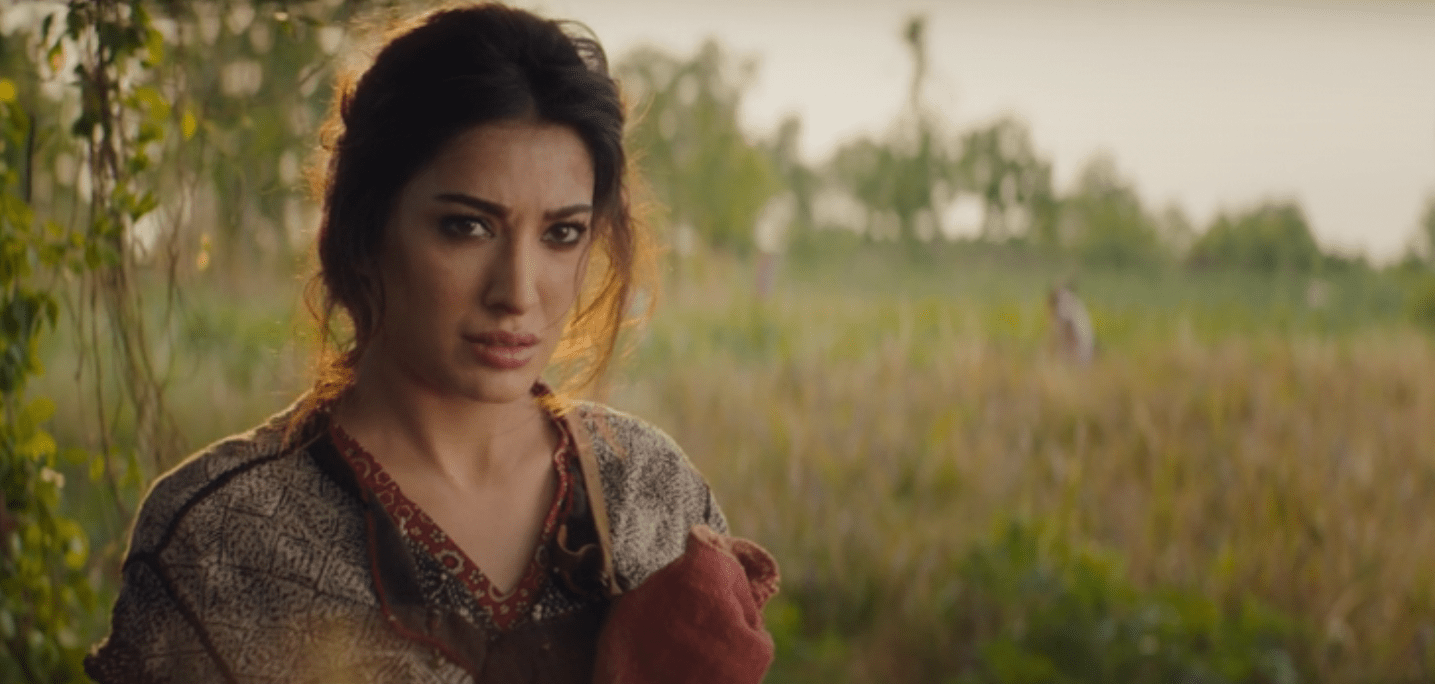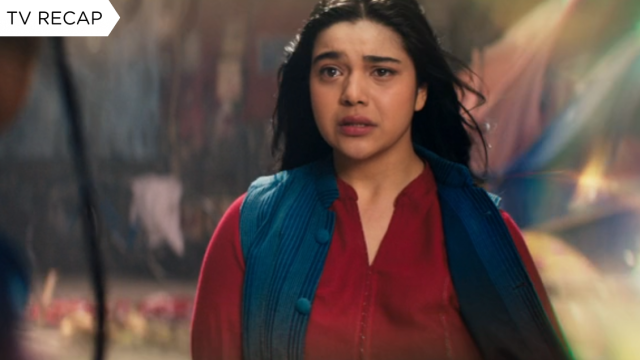Last we left Ms. Marvel’s burgeoning young hero, Kamala Khan (Iman Vellani), she found herself transported back in time to Partition-era India at a train station after the leader of the Clandestine, Najma (Nimra Bucha) accidentally struck her family bangle. Has the bangle actually sent Kamala back in time? What will she discover?

But instead of starting with Kamala, this episode starts with her great-grandmother Aisha (Mewish Hayat). We begin the episode with an old video of British news video in 1947, proclaiming how “India will awake to light and freedom” and the creation of Pakistan would now be the home for Muslims. But we learn immediately about how riots and violent outbreak occurred across the region. This is Partition-era India, the largest mass migration in history, created by nearly a century of British Imperialism, persecution of Muslims that spurred Muslim leaders to ask for their own independent nation, and political incompetence that resulted in mass death, displacement, and family separation. The lingering effects of that generational trauma continue to this day across South Asia. I’ve heard from multiple South Asian colleagues and friends that “everyone has a Partition story” that has affected their families — and in this episode, we view that of Kamala’s family.
We then cut to 1942 where we see Aisha run from and kill a British soldier chasing her. We see her husband future Hasan (Fawad Khan) give a rousing speech to his community for independence before the British colonizers come to disperse the crowd. We then see the blossoming of their romance as Hasan offers Aisha a place to stay for the night. These are intimate and lovely scenes as we see Kamala’s great-grandparents’ story. “I like your roses,” Aisha says as she proceeds to tell Hasan her name, which means “She who lives.”

We cut ahead in time to see that Aisha has settled down with Hasan, and is now pregnant with their child. We then see Aisha singing to baby Sana in Urdu as Hasan overlooks them. We then cut to several years later when Sana is a child and Hasan listens to the British radio propaganda, calling out its hypocrisy. Their (presumably Hindu) neighbour Rohan then comes, offering them milk and vegetables for free. While Aisha graciously accepts his charity, Hasan refuses, prompting their neighbour to say he’s “playing right into the hands of the British” for not accepting. In particularly searing scene, Hasan points out the prejudices he and presumably Aisha have faced: he’s been pushed out of his home, no one is willing to buy flowers from him, and no one will sell milk to his wife. Simply because they’re Muslim. The realities of the intra-community divisions the British exploited and exacerbated are shown to us here.
Just then, Aisha sees someone out in the field. It’s Najma, and she goes out to meet her. Najma embraces her presumed friend, while Aisha looks uncertain at their reunion, and Najma mentions wanting to put their “plan into action.” Namely, the same plan she has in Kamala’s time, to use the bangle to open the door to the Noor dimension. Aisha has until sundown tomorrow, but will she comply?
We cut to the family making a plan to go to Pakistan as the riots are spreading. While Hasan expresses doubt about leaving his home, Aisha convinces him that no matter where they are it’ll be home, and very curiously reminds Hasan that he was the one who taught her “What you seek is seeking you.” (It’s the same phrase by the famous Persian poet Rumi that appears on Kamala’s bangle.) She then gives the bangle to Sana for safekeeping. We then cut to Aisha and Hasan in the crowds going towards the train, but Hasan calls her out for wanting to run away from Najma. She then finally reveals the truth about the bangle’s “magic” to Hasan. He reveals to her that while he did suspect something, he “never cared” because she chose them and that’s what mattered. Aisha then has Hasan promise he’ll get Sana on the last train to Karachi.
We cut to the train station, where Aisha sees Najma go after them, leaving Hasan and a crying Sana to board the train. Najma accuses Aisha of turning their back on them, and immediately stabs Aisha in the stomach, as she yells after her that “It won’t work!” It all happens so quickly in the midst of the chaos of the mass migration. In a very sad scene, we see Sana jump off the train as she calls out crying for her Ammi. Aisha hears her daughter, looks at their photo together, and calls out “What you seek is seeking you.” Her eyes glow purple, the bangle falls to the floor from Sana, and we immediately cut back to where we left Kamala at the end of the last episode.
Kamala almost immediately finds her great-grandmother, who’s lying down in a cart dying. She tells Kamala (whom she thinks is Sana) to “get Sana on the train and protect that bangle.” It appears that she used the bangle in an attempt to get a future Sana to save herself, but got Kamala instead. Aisha then passes away, having confidence that Kamala will achieve it because “she is here.” Kamala finds and carries Sana to safety. She uses the bangle to give Sana hard light platforms to step on through the crowd, which she then sees as the “trail of stars” from her story. It’s an incredibly beautiful and emotional scene as Hasan finds his daughter. Kamala realises it was she who saved her family as she watches Sana and Hasan travel safely away on the last train.

As you might imagine, there are a large number of changes to this particular story from the comics. During the Ms. Marvel comics set during the Civil War II arc, we got a few scenes of Kamala’s great-grandparents Aisha (who is pregnant with Kamala’s grandmother on the journey) and Kareem (his name was changed to “Hasan” in the show) as they start to undertake the journey to Pakistan from Mumbai. The bangle is never supernatural, but is extremely important to the couple, as it is her wedding bangle where Aisha hid the money she got from selling her jewellery, ensuring the family has enough to start a new life in Pakistan. The show, in attempting to tie Kamala’s powers more closely to her family rather than them just happening to be Inhuman, decided to extrapolate more out of this storyline and have it be part of the origins for Kamala’s heroism.
As presented quite simply in this episode, this is where this approach has worked best. No discussion of “Djinn,” barely any mention of another dimension, only a family working their way to survive, and being there for one another in truly compelling ways. Just as Kamala’s family has always been. Once again, this is where Ms. Marvel tends to work best — and if we should get a season two after next week’s season one finale on Disney+, hopefully the show will continue to focus on that.
Ms. Marvel streams Wednesdays on Disney+.
Want more Gizmodo news? Check out when to expect the latest Marvel and Star Wars releases, what’s next for the DC Universe on film and TV, and everything you need to know about House of the Dragon and Lord of the Rings: The Rings of Power.
